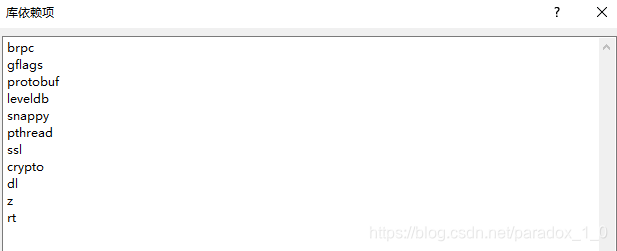rpc_proto文件:
syntax="proto2";
package example;
option cc_generic_services = true;
//=====service 1
message EchoRequest {
required string message = 1;
};
message EchoResponse {
required string message = 1;
};
service EchoService {
rpc Echo(EchoRequest) returns (EchoResponse);
};
//=====service 2
service Greeter {
// Sends a greeting
rpc SayHello (HelloRequest) returns (HelloReply) {}
}
// The request message containing the user's name.
message HelloRequest {
required string name = 1;
}
// The response message containing the greetings
message HelloReply {
required string message = 1;
}
这里定义了两种服务协议。
server.cpp服务端文件:
#include <cstdio>
#include <gflags/gflags.h>
#include <butil/logging.h>
#include <brpc/server.h>
#include "echo.pb.h"
DEFINE_bool(echo_attachment, true, "Echo attachment as well");
DEFINE_int32(port, 8000, "TCP Port of this server");
DEFINE_int32(idle_timeout_s, -1, "Connection will be closed if there is no "
"read/write operations during the last `idle_timeout_s'");
DEFINE_int32(logoff_ms, 2000, "Maximum duration of server's LOGOFF state "
"(waiting for client to close connection before server stops)");
DEFINE_bool(gzip, false, "compress body using gzip");
// Your implementation of example::EchoService
// Notice that implementing brpc::Describable grants the ability to put
// additional information in /status.
namespace example {
class EchoServiceImpl : public EchoService {
public:
EchoServiceImpl() {};
virtual ~EchoServiceImpl() {};
virtual void Echo(google::protobuf::RpcController* cntl_base,
const EchoRequest* request,
EchoResponse* response,
google::protobuf::Closure* done) {
// This object helps you to call done->Run() in RAII style. If you need
// to process the request asynchronously, pass done_guard.release().
brpc::ClosureGuard done_guard(done);
brpc::Controller* cntl =
static_cast<brpc::Controller*>(cntl_base);
// The purpose of following logs is to help you to understand
// how clients interact with servers more intuitively. You should
// remove these logs in performance-sensitive servers.
LOG(INFO) << "Received request[log_id=" << cntl->log_id()
<< "] from " << cntl->remote_side()
<< " to " << cntl->local_side()
<< ": " << request->message()
<< " (attached=" << cntl->request_attachment() << ")";
// Fill response.
response->set_message(request->message());
// You can compress the response by setting Controller, but be aware
// that compression may be costly, evaluate before turning on.
// cntl->set_response_compress_type(brpc::COMPRESS_TYPE_GZIP);
if (FLAGS_echo_attachment) {
// Set attachment which is wired to network directly instead of
// being serialized into protobuf messages.
cntl->response_attachment().append(cntl->request_attachment());
}
}
};
//===
class GreeterImpl : public Greeter {
public:
GreeterImpl() {};
virtual ~GreeterImpl() {};
void SayHello(google::protobuf::RpcController* cntl_base,
const HelloRequest* req,
HelloReply* res,
google::protobuf::Closure* done) {
brpc::ClosureGuard done_guard(done);
brpc::Controller* cntl = static_cast<brpc::Controller*>(cntl_base);
sleep(10);
if (FLAGS_gzip) {
cntl->set_response_compress_type(brpc::COMPRESS_TYPE_GZIP);
}
res->set_message("Hello " + req->name());
}
};
} // namespace example
int main(int argc, char* argv[]) {
// Parse gflags. We recommend you to use gflags as well.
google::ParseCommandLineFlags(&argc, &argv, true);
// Generally you only need one Server.
brpc::Server server;
// Instance of your service.
example::EchoServiceImpl echo_service_impl;
example::GreeterImpl greeter_impl;
// Add the service into server. Notice the second parameter, because the
// service is put on stack, we don't want server to delete it, otherwise
// use brpc::SERVER_OWNS_SERVICE.
if (server.AddService(&echo_service_impl,
brpc::SERVER_DOESNT_OWN_SERVICE) != 0) {
LOG(ERROR) << "Fail to add service";
return -1;
}
if (server.AddService(&greeter_impl,
brpc::SERVER_DOESNT_OWN_SERVICE) != 0) {
LOG(ERROR) << "Fail to add service";
return -1;
}
// Start the server.
brpc::ServerOptions options;
options.idle_timeout_sec = FLAGS_idle_timeout_s;
if (server.Start(FLAGS_port, &options) != 0) {
LOG(ERROR) << "Fail to start EchoServer";
return -1;
}
// Wait until Ctrl-C is pressed, then Stop() and Join() the server.
server.RunUntilAskedToQuit();
return 0;
}client.cpp客户端文件:
#include <cstdio>
#include <gflags/gflags.h>
#include <butil/logging.h>
#include <butil/time.h>
#include <brpc/channel.h>
#include "echo.pb.h"
DEFINE_string(attachment, "", "Carry this along with requests");
DEFINE_string(protocol, "baidu_std", "Protocol type. Defined in src/brpc/options.proto");
DEFINE_string(connection_type, "", "Connection type. Available values: single, pooled, short");
DEFINE_string(server, "127.0.0.1:8000", "IP Address of server");
DEFINE_string(load_balancer, "", "The algorithm for load balancing");
DEFINE_int32(timeout_ms, 20000, "RPC timeout in milliseconds");
DEFINE_int32(max_retry, 3, "Max retries(not including the first RPC)");
DEFINE_int32(interval_ms, 1000, "Milliseconds between consecutive requests");
int main(int argc, char* argv[]) {
// Parse gflags. We recommend you to use gflags as well.
google::ParseCommandLineFlags(&argc, &argv, true);
// A Channel represents a communication line to a Server. Notice that
// Channel is thread-safe and can be shared by all threads in your program.
brpc::Channel channel;
// Initialize the channel, NULL means using default options.
brpc::ChannelOptions options;
options.protocol = FLAGS_protocol;
options.connection_type = FLAGS_connection_type;
options.timeout_ms = FLAGS_timeout_ms/*milliseconds*/;
options.max_retry = FLAGS_max_retry;
if (channel.Init(FLAGS_server.c_str(), FLAGS_load_balancer.c_str(), &options) != 0) {
LOG(ERROR) << "Fail to initialize channel";
return -1;
}
// Normally, you should not call a Channel directly, but instead construct
// a stub Service wrapping it. stub can be shared by all threads as well.
example::EchoService_Stub stub(&channel);
example::Greeter_Stub greeter_stub(&channel);
// Send a request and wait for the response every 1 second.
int log_id = 0;
while (!brpc::IsAskedToQuit()) {
// We will receive response synchronously, safe to put variables
// on stack.
example::EchoRequest request;
example::EchoResponse response;
brpc::Controller cntl;
request.set_message("hello world");
cntl.set_log_id(log_id++); // set by user
// Set attachment which is wired to network directly instead of
// being serialized into protobuf messages.
cntl.request_attachment().append(FLAGS_attachment);
// Because `done'(last parameter) is NULL, this function waits until
// the response comes back or error occurs(including timedout).
stub.Echo(&cntl, &request, &response, NULL);
if (!cntl.Failed()) {
LOG(INFO) << "Received response from " << cntl.remote_side()
<< " to " << cntl.local_side()
<< ": " << response.message() << " (attached="
<< cntl.response_attachment() << ")"
<< " latency=" << cntl.latency_us() << "us";
}
else {
LOG(WARNING) << cntl.ErrorText();
}
cntl.Reset();
example::HelloRequest helloRequest;
example::HelloReply helloReply;
helloRequest.set_name("xiao hua");
cntl.set_log_id(log_id++);
greeter_stub.SayHello(&cntl, &helloRequest, &helloReply, NULL);
if (!cntl.Failed()) {
LOG(INFO) << "Received response from " << cntl.remote_side()
<< " to " << cntl.local_side()
<< ": " << helloReply.message() << " (attached="
<< cntl.response_attachment() << ")"
<< " latency=" << cntl.latency_us() << "us";
}
else {
LOG(WARNING) << cntl.ErrorText();
}
usleep(FLAGS_interval_ms * 1000L);
}
LOG(INFO) << "EchoClient is going to quit";
return 0;
}这里我是使用VS2019远程调试的,所以就没有Makefile文件。不得不说VS对Linux程序的支持体验真的是越来越好了,感觉可以告别notepad++的时代了。
另外附上程序需要的库依赖项:

各种平台下brpc的编译见github:
https://github.com/apache/incubator-brpc/blob/master/docs/cn/getting_started.md
这里需要注意一点是openssl库的版本使用1.1.0以上的,否则会出现undefined referenced的错误。原因就是之前版本中的许多宏定义在新版本中已经换成了函数,虽然他们的名称是相同的。








 本文介绍BRPC框架下的RPC服务实现,包括服务端与客户端的代码示例,涉及protobuf消息定义、服务注册与调用流程。同时分享了VS2019远程调试经验及依赖库配置细节。
本文介绍BRPC框架下的RPC服务实现,包括服务端与客户端的代码示例,涉及protobuf消息定义、服务注册与调用流程。同时分享了VS2019远程调试经验及依赖库配置细节。
















 1362
1362

 被折叠的 条评论
为什么被折叠?
被折叠的 条评论
为什么被折叠?








